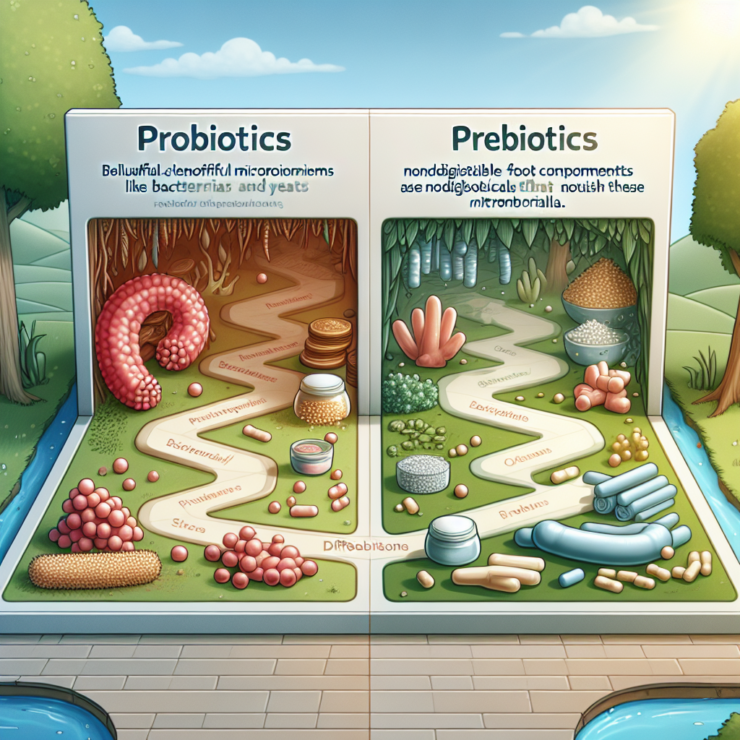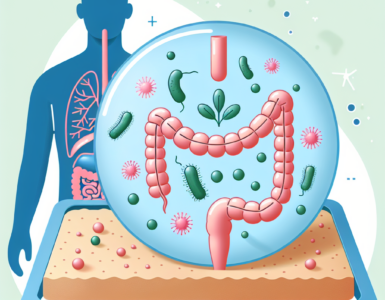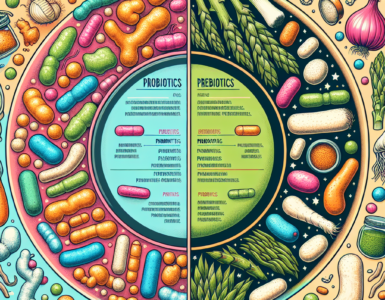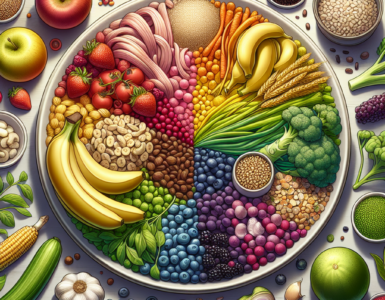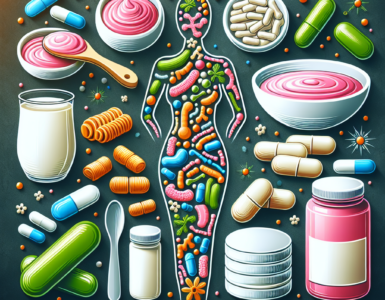Introduction to Gut Health
The Importance of a Healthy Gut
The gastrointestinal system, or gut, is a critical hub in the human body that goes beyond the mere digestion of food. It’s a complex network where nutrients are absorbed, and it plays a pivotal role in safeguarding overall health. A healthy gut is fundamental in maintaining a robust immune system, synthesizing vital vitamins, and even regulating mood through the gut-brain axis.
The gut houses trillions of microorganisms, including bacteria, viruses, fungi, and protozoa, collectively known as the gut microbiota. This diverse microbial community is essential for digestive health, as it aids in breaking down complex molecules and combating harmful pathogens. The balance of this ecosystem is crucial – disruptions can lead to a myriad of health issues.
How Gut Health Affects Overall Wellbeing
Gut health exerts a significant influence on the body’s overall function and wellness. The state of the gut microbiota can impact everything from metabolic processes to the immune system’s effectiveness. Here’s how a well-balanced gut can contribute to various aspects of health:
- Immune Function: A substantial portion of the body’s immune cells reside in the gut, where they are exposed to various antigens and trained to react accordingly.
- Nutrient Absorption: Efficient nutrient absorption depends on a healthy gut lining, which can be compromised if gut health deteriorates.
- Mental Health: The gut-brain axis suggests a direct communication pathway between the gut and the brain, influencing mood and cognitive functions.
The interconnectivity of gut health with overall wellbeing underscores the necessity of nurturing our gut microbiota. The subsequent sections will explore probiotics and prebiotics, two key components in maintaining a healthy gut, and unveil the difference between probiotics and prebiotics in the context of gut health.
Understanding Probiotics
In the context of gut health, probiotics are a critical component that can influence the body’s wellbeing. Here we will delve into what probiotics are and their role in maintaining a healthy gastrointestinal system.
What Are Probiotics?
Probiotics are live microorganisms, typically bacteria, which are similar to beneficial microorganisms found in the human gut. They are often referred to as “good” or “friendly” bacteria because they help keep the gut healthy.
Probiotics are commonly found in fermented foods and as dietary supplements. The most familiar groups of probiotics include Lactobacillus and Bifidobacterium, each of which contains different species and strains that can have various effects on the body.
The Role of Probiotics in Gut Health
Probiotics contribute to gut health in several ways:
Maintaining a Balanced Microbiome: They help balance the gut microbiota, the community of microorganisms living in the intestines, which is crucial for digestion, immune function, and other aspects of health.
Barrier Protection: Probiotics can enhance the integrity of the mucosal barrier, which acts as a protective lining against harmful pathogens.
Immune Support: They support the immune system by increasing the production of natural antibodies and may boost immune cells like the IgA-producing cells, T lymphocytes, and natural killer cells.
Digestive Health: Probiotics aid in digestion by breaking down indigestible fibers and helping in the absorption of nutrients.
Synthesis of Nutrients: Some probiotics can synthesize essential nutrients, such as vitamin K and certain B vitamins.
Combating Pathogens: They compete with potential harmful bacteria, preventing them from settling in the gut.
The following table offers a snapshot of the benefits associated with the intake of probiotics:
| Benefit | Description |
|---|---|
| Microbiome Balance | Helps in maintaining a healthy balance of gut bacteria. |
| Barrier Protection | Strengthens the gut lining to protect against pathogens. |
| Immune Support | Enhances the body’s natural defense mechanisms. |
| Digestive Health | Aids in breaking down fibers and nutrient absorption. |
| Nutrient Synthesis | Some strains produce vitamins and other essential nutrients. |
| Pathogen Combat | Competes with harmful bacteria to prevent their colonization in the gut. |
It is important for individuals to understand the role of probiotics in gut health and how they can contribute to overall wellness. By supporting the gut microbiota, probiotics play a significant part in sustaining the body’s health equilibrium.
Understanding Prebiotics
Prebiotics play a pivotal role in gut health, functioning as the sustenance for the beneficial bacteria within the gut. Their impact is profound, influencing not only the wellbeing of the gastrointestinal tract but also the overall health of individuals.
What Are Prebiotics?
Prebiotics are specialized plant fibers that act as nourishment for the good bacteria, also known as probiotics, in the digestive system. Unlike other fibers, they are indigestible by the human body and thus pass through the gastrointestinal tract undigested. This allows them to reach the colon, where they feed the thriving microbial community.
| Characteristics | Description |
|---|---|
| Composition | Non-digestible fibers and compounds |
| Function | Stimulate growth & activity of beneficial bacteria |
| Digestibility | Resistant to human digestive enzymes |
The Role of Prebiotics in Gut Health
The role of prebiotics in gut health is to foster a conducive environment for the flourishing of probiotics. They encourage the growth and activity of these friendly bacteria, which in turn contributes to the integrity of the gut lining, aids in digestion, and enhances immune function. By doing so, prebiotics help maintain a balanced and diverse gut microbiota, which is essential for proper gut health and overall wellness.
| Benefits | Description |
|---|---|
| Gut Barrier Integrity | Support the lining of the gut to prevent leaky gut syndrome |
| Digestive Efficiency | Aid in the absorption of nutrients and digestion |
| Immune Function | Enhance the body’s ability to fend off pathogens |
Prebiotics are an integral part of a health-conscious individual’s diet, and understanding their role is key in managing and optimizing gut health. By ensuring the intake of adequate prebiotics, one can support the growth of beneficial gut bacteria, promoting a robust and resilient digestive system.
Key Differences Between Probiotics and Prebiotics
Understanding the difference between probiotics and prebiotics is essential for those looking to enhance their gut health through nutrition. While both play critical roles in maintaining gut balance and function, they differ in composition, nature, and how they benefit the gastrointestinal system.
Composition and Nature
Probiotics are live microorganisms that confer a health benefit on the host when administered in adequate amounts. They are composed of beneficial bacteria or yeast that are similar to the microorganisms naturally found in the human gut.
Prebiotics, on the other hand, are non-digestible food components that selectively stimulate the growth or activity of advantageous bacteria in the gut. They are typically dietary fibers or complex carbohydrates that the human body cannot digest.
| Probiotics | Prebiotics |
|---|---|
| Live microorganisms (bacteria or yeast) | Non-digestible food components |
| Similar to gut’s natural microflora | Stimulate growth of beneficial bacteria |
Function and Mechanism in the Gut
Probiotics function by inhabiting the gut and potentially restoring the balance of the gut flora. They can help to outcompete harmful bacteria, support immune function, and enhance the gut barrier.
Prebiotics work by serving as fuel for beneficial bacteria in the gut. They are not absorbed in the upper gastrointestinal tract and thus reach the colon intact, where they are fermented by the gut microflora. This fermentation process produces short-chain fatty acids that have beneficial effects on gut health.
| Probiotics | Prebiotics |
|---|---|
| Restore balance of gut flora | Provide fuel for beneficial bacteria |
| Support immune function | Fermented in the colon |
| Enhance gut barrier | Produce health-promoting compounds |
Sources of Probiotics and Prebiotics
Probiotics are commonly found in fermented foods such as yogurt, kefir, sauerkraut, and kimchi, as well as in dietary supplements. Prebiotics are found in a variety of foods including bananas, onions, garlic, leeks, asparagus, artichokes, and whole grains.
It is important to note that the effectiveness and stability of probiotics can be influenced by factors such as storage conditions and the presence of prebiotics. Prebiotics, being dietary fibers, are generally stable and can be easily incorporated into the diet.
| Probiotics | Prebiotics |
|---|---|
| Fermented foods (yogurt, kefir) | Bananas, onions, garlic |
| Dietary supplements | Leeks, asparagus, artichokes |
| Need specific storage conditions | Whole grains |
By understanding the key differences in composition, function, and sources, individuals can make informed decisions about incorporating probiotics and prebiotics into their diet to support their gut health and overall wellbeing.
The Symbiotic Relationship
The interplay between probiotics and prebiotics is crucial for maintaining a balanced gut microbiome and, subsequently, overall health. This section explores the synergistic effects of these two dietary components and their collective impact on the gut’s ecosystem.
How Probiotics and Prebiotics Work Together
Probiotics are live microorganisms that, when ingested in adequate amounts, confer health benefits to the host. They are akin to the beneficial bacteria that naturally inhabit the gut. Prebiotics, on the other hand, are non-digestible fibers that serve as food for these beneficial bacteria.
The relationship between probiotics and prebiotics is often described as synergistic because prebiotics help to fuel the probiotics, allowing them to thrive, reproduce, and colonize the gut more effectively. This symbiotic relationship can enhance the gut flora’s resilience and its ability to fight off pathogenic bacteria. Essentially, prebiotics act as the sustenance that enables probiotics to perform their functions optimally.
Here is how probiotics and prebiotics interact within the gut:
| Probiotics | Prebiotics | Symbiotic Interaction |
|---|---|---|
| Enhance gut flora | Serve as food for good bacteria | Improved survival and growth of probiotics |
| Help in nutrient absorption | Stimulate growth of beneficial bacteria | Enhanced nutrient synthesis and absorption |
| Produce antimicrobial substances | Increase resistance to pathogens | Strengthened gut barrier against pathogens |
The Impact on the Microbiome
The gut microbiome is a complex community of microorganisms that plays a pivotal role in digestion, immunity, and overall health. Probiotics introduce beneficial bacteria to this community, while prebiotics ensure that these beneficial microbes are well-nourished.
The combination of probiotics and prebiotics has a profound impact on the microbiome by:
- Enhancing the diversity of the microbial population, which is associated with better health outcomes.
- Strengthening the gut barrier function, thereby reducing the likelihood of harmful substances entering the bloodstream.
- Modulating the immune system, leading to improved immune responses and a reduction in inflammation.
- Influencing the production of short-chain fatty acids, which are vital for colon health and may protect against certain diseases.
By fostering a robust microbiome through the symbiotic use of probiotics and prebiotics, individuals can potentially enhance their digestive health, bolster their immune function, and promote overall wellness. It is through this intricate interplay that the full potential of a balanced diet rich in these components can be realized.
Incorporating Probiotics and Prebiotics into Your Diet
Enriching one’s diet with probiotics and prebiotics is a strategic move for those aiming to bolster gut health. Understanding the variety of dietary sources available for these beneficial compounds is the first step toward achieving a balanced gut microbiome.
Dietary Sources of Probiotics
Probiotics, the live microorganisms that confer health benefits when consumed in adequate amounts, are found in a variety of fermented foods. Regular inclusion of these foods in the diet can help maintain and improve the balance of gut flora.
| Probiotic Food Sources | Common Serving Size |
|---|---|
| Yogurt | 1 cup |
| Kefir | 1 cup |
| Sauerkraut | 1/2 cup |
| Kimchi | 1/2 cup |
| Miso | 1 tablespoon |
| Tempeh | 1/2 cup |
| Pickles (fermented) | 1/2 cup |
Fermented dairy products, such as yogurt and kefir, are among the most well-known probiotic-rich foods. Vegetarian options include sauerkraut, kimchi, miso, tempeh, and certain types of pickles, which have undergone natural fermentation processes and not pasteurization, as this can destroy the live cultures.
Dietary Sources of Prebiotics
Prebiotics are dietary fibers that the human body cannot digest. They serve as nourishment for probiotics, stimulating the growth and activity of beneficial bacteria in the gut.
| Prebiotic Food Sources | Fiber Content (grams per serving) |
|---|---|
| Chicory Root | 4.5 g per 1 oz |
| Jerusalem Artichoke | 2.0 g per 1 oz |
| Garlic | 1.2 g per clove |
| Onions | 1.5 g per 1/2 cup |
| Leeks | 1.8 g per 1/2 cup |
| Asparagus | 1.5 g per 1/2 cup |
| Bananas | 3.0 g per medium banana |
| Whole Wheat Foods | Varies |
These sources contain inulin and other prebiotic fibers that are known to support the growth of probiotics. Integrating a mix of these foods into daily meals can significantly enhance the prebiotic intake.
Balancing Probiotics and Prebiotics for Optimal Health
For optimal gut health, it’s crucial to maintain a balance between probiotics and prebiotics. Including a variety of foods from both categories ensures that probiotics have the necessary resources to thrive and exert their beneficial effects on gut health.
| Meal Ideas | Probiotic Source | Prebiotic Source |
|---|---|---|
| Breakfast | Yogurt or Kefir | Banana |
| Lunch | Tempeh burger | Whole wheat bun, onions, garlic sauce |
| Dinner | Miso soup | Asparagus side dish |
By combining probiotic and prebiotic foods in meals throughout the day, individuals can foster a nourishing environment for their gut microbiota. This synergy promotes not only a robust digestive system but also contributes to overall wellbeing. Keeping in mind the diversity of these foods, one can enjoy a rich and varied diet that supports a healthy gut ecosystem.
Frequently Asked Questions
As individuals delve deeper into the nuances of gut health, several common inquiries emerge regarding the use of probiotics and prebiotics. This section addresses these questions, offering clear and concise information to further understanding in this important area of health and nutrition.
Can You Take Probiotics and Prebiotics Together?
Yes, individuals can take probiotics and prebiotics together, and doing so can be beneficial for gut health. This combination is often referred to as “synbiotic,” implying that the two can work synergistically to enhance the gut microbiome. Probiotics, the beneficial bacteria, can thrive and multiply more effectively in the presence of prebiotics, which serve as their food source. Together, they contribute to a balanced gut environment conducive to overall health.
What Are the Signs of an Unhealthy Gut?
An unhealthy gut can manifest in various ways, and recognizing these signs is key to addressing potential issues early. Common indicators of an imbalanced gut microbiome include:
| Sign | Description |
|---|---|
| Digestive issues | Frequent bloating, gas, constipation, or diarrhea. |
| Unintentional weight changes | Unexplained weight gain or loss without changes in diet or exercise habits. |
| Sleep disturbances | Poor sleep quality or chronic fatigue. |
| Skin irritation | Conditions such as eczema may be linked to gut health. |
| Food intolerances | Difficulty digesting certain foods, which may be due to poor quality of gut bacteria. |
How Long Does It Take for Probiotics and Prebiotics to Affect Gut Health?
The time it takes for probiotics and prebiotics to impact gut health can vary based on several factors, including the individual’s current gut health, diet, and lifestyle. Some people may notice improvements in digestion and overall wellbeing within a few days, while for others, it may take several weeks to observe tangible benefits.
It is crucial to maintain consistency when incorporating probiotics and prebiotics into the diet. Over time, they can contribute to a healthier gut microbiome, which in turn, supports overall health. However, for lasting effects, it’s important to integrate these elements as part of a sustained, balanced diet rather than a short-term solution.
Disclaimer: This content is intended for informational purposes only and does not constitute medical advice, diagnosis, or treatment. While diet plays a significant role in supporting gut health, individual needs may vary. Always consult with a healthcare professional or a registered dietitian before making any changes to your diet, especially if you have existing health conditions or concerns. Use of this information is at your own risk.


